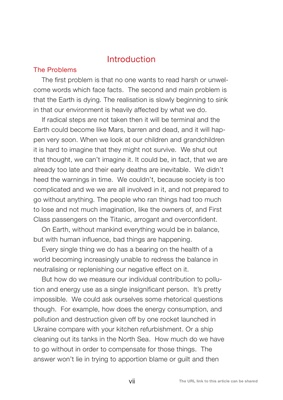
vii
Introduction
The Problems
The first problem is that no one wants to read harsh or unwelcome
words which face facts. The second and main problem is
that the Earth is dying. The realisation is slowly beginning to sink
in that our environment is heavily affected by what we do.
If radical steps are not taken then it will be terminal and the
Earth could become like Mars, barren and dead, and it will happen
very soon. When we look at our children and grandchildren
it is hard to imagine that they might not survive. We shut out
that thought, we can't imagine it. It could be, in fact, that we are
already too late and their early deaths are inevitable. We didn't
heed the warnings in time. We couldn't, because society is too
complicated and we we are all involved in it, and not prepared to
go without anything. The people who ran things had too much
to lose and not much imagination, like the owners of, and First
Class passengers on the Titanic, arrogant and overconfident.
On Earth, without mankind everything would be in balance,
but with human influence, bad things are happening.
Every single thing we do has a bearing on the health of a
world becoming increasingly unable to redress the balance in
neutralising or replenishing our negative effect on it.
But how do we measure our individual contribution to pollution
and energy use as a single insignificant person. It's pretty
impossible. We could ask ourselves some rhetorical questions
though. For example, how does the energy consumption, and
pollution and destruction given off by one rocket launched in
Ukraine compare with your kitchen refurbishment. Or a ship
cleaning out its tanks in the North Sea. How much do we have
to go without in order to compensate for those things. The
answer won't lie in trying to apportion blame or guilt and then
The URL link to this article can be shared